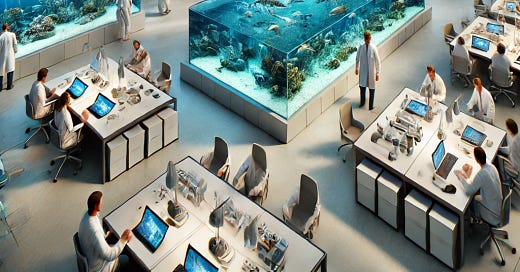Discovering the Marine Research Centers of Florida: A Dive into Ocean Conservation
Florida is more than just a destination for beautiful beaches and sunny weather—it's also a hub for marine science and research that plays a vital role in ocean conservation worldwide. Scattered across the state, marine research centers work tirelessly to understand and protect our oceans, making them not just centers of scientific discovery but also exciting places for the public to visit and learn. Whether you're a marine enthusiast, a student, or a curious traveler, these centers offer a unique opportunity to dive deep into the mysteries of the ocean and witness firsthand the efforts being made to preserve marine life for future generations.
Florida is home to several renowned marine research centers, each with its own unique focus and set of attractions. The Mote Marine Laboratory & Aquarium in Sarasota is one of the state’s most well-known centers. Established in 1955, Mote has grown into a world-class marine research facility that also offers an interactive aquarium experience. Here, visitors can explore exhibits that showcase the fascinating world of marine animals, from sharks and sea turtles to manatees and corals. The facility is also home to groundbreaking research in areas like coral reef restoration and shark biology, making it a must-visit for anyone interested in marine science.
On the east coast of Florida, the Harbor Branch Oceanographic Institute in Fort Pierce is another key player in marine research. Affiliated with Florida Atlantic University, Harbor Branch is dedicated to studying the ocean’s depths and the creatures that inhabit them. Visitors can tour the Ocean Discovery Visitor’s Center, where exhibits highlight the institute’s research in marine biotechnology, aquaculture, and ocean engineering. The center also offers educational programs and workshops for those interested in learning more about the ocean and its many secrets. A visit here not only supports marine research but also inspires a deeper appreciation for the vast and largely unexplored underwater world.
For those interested in the intersection of marine science and education, the Florida Keys Eco-Discovery Center in Key West provides an engaging experience focused on the unique ecosystems of the Florida Keys. Managed by the National Oceanic and Atmospheric Administration (NOAA), the center offers interactive exhibits that teach visitors about the region's coral reefs, seagrass beds, and mangroves. The center also highlights NOAA’s efforts in conservation and the protection of marine species. This family-friendly destination is perfect for all ages and offers a hands-on approach to learning about the delicate balance of the Florida Keys' marine environment.
In the heart of Miami, the University of Miami's Rosenstiel School of Marine and Atmospheric Science is a leading institution for oceanographic research. The Rosenstiel School conducts a wide range of research, from studying climate change’s impact on marine ecosystems to developing technologies for sustainable fishing. The school offers public tours and hosts special events, allowing visitors to engage with scientists and learn about the latest research findings. For those interested in pursuing a career in marine science, a visit to Rosenstiel can be incredibly inspiring, offering a glimpse into the cutting-edge work being done to understand and protect our oceans.
If you venture further north, the Florida Oceanographic Coastal Center in Stuart is another fantastic destination for marine lovers. This 57-acre outdoor center is dedicated to promoting the preservation of Florida’s coastal ecosystems through research, education, and advocacy. Visitors can participate in guided nature walks, visit the sea turtle pavilion, and even feed stingrays in the touch tank. The center also offers programs that allow you to get up close and personal with some of Florida’s most iconic marine species, making it an educational and memorable experience for the entire family.
No tour of Florida’s marine research centers would be complete without a visit to the Gulf Specimen Marine Laboratory in Panacea. This unique facility specializes in collecting and studying marine life from the Gulf of Mexico and is known for its hands-on approach to marine education. The laboratory’s public aquarium features touch tanks where visitors can interact with sea stars, horseshoe crabs, and other marine creatures. The facility also plays a crucial role in the study of marine biology and the preservation of endangered species, making it a must-visit for anyone interested in marine conservation.
While these are some of the most notable marine research centers in Florida, the state is home to many more institutions that contribute to our understanding of the oceans. Each of these centers offers a unique experience, allowing visitors to engage with marine science in a way that’s both educational and entertaining. Whether you're interested in the latest research on coral reefs, want to learn more about sea turtles, or simply enjoy exploring aquariums, Florida’s marine research centers provide a fascinating glimpse into the underwater world and the efforts to protect it.
In conclusion, the marine research centers of Florida are more than just places of scientific study—they’re gateways to understanding the complex and beautiful ecosystems that make up our oceans. By visiting these centers, you not only support their important work but also gain a deeper appreciation for the marine life that thrives off Florida’s shores. Whether you’re a resident or a visitor, these centers offer an exciting adventure that’s both educational and inspiring. So next time you find yourself in Florida, consider adding one of these marine research centers to your itinerary—you won’t be disappointed.



